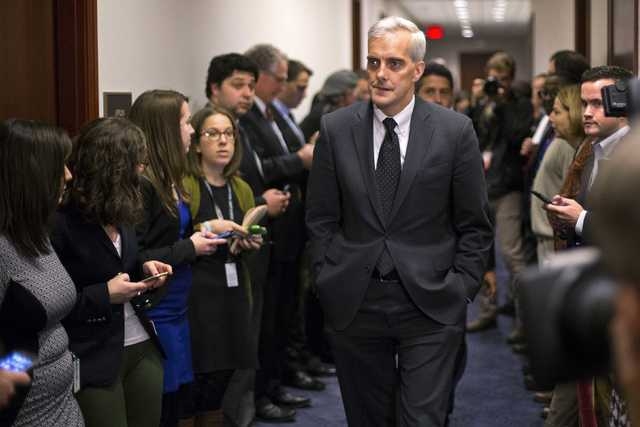Washington Digest: House approves spending bill
WASHINGTON — With only hours to spare, the House last week approved a $1.1 trillion spending bill needed to avoid a government shutdown.
The bill passed 219-206 late Thursday, hours before the government was scheduled to run out of money. The Senate passed a temporary two-day bill to keep the doors open and worked into the weekend to finish the legislation.
Then, late Saturday night, the Senate followed suit, voting 56-40 to approve the measure.
The 1,603-page bill would set funding priorities and new policies for most federal agencies through the current fiscal year that began Oct. 1. It would fund the Department of Homeland Security only through February — setting up an early policy battle for the next Congress over President Barack Obama’s immigration policies.
Rep. Tom Cole, R-Okla., said the bill was the result of bicameral and bipartisan negotiations and was needed to keep the government operating.
“The absence of passing this bill will shut down the government. I don’t think that is something that either they, or our friends in the Senate or in the administration, want to do,” Cole said.
But the bill drew opposition from the left and the right.
Republican opposition focused largely on immigration. A number of GOP lawmakers were unwilling to support a deal that did not block Obama’s executive order that would shield millions of immigrants in the country illegally from deportation.
Democrats who opposed the bill complained it would erode sweeping banking reforms adopted in the wake of the 2008 financial crisis.
Republican supporters noted that the omnibus bill — unlike another continuing resolution — included policy changes and spending cuts that they have long sought.
“When you combine the emergency spending with outlays, this is lower than last year, and it is a lot lower than the year before. So if you want to hold the line on spending, this is a good vote for you,” said Rep. Jack Kingston, R-Ga.,
Reps. Mark Amodei, R-Nev., Joe Heck, R-Nev., and Steve Horsford, D-Nev., voted for the spending bill. Rep. Dina Titus, D-Nev., voted against it.
U.S. Sen. Harry Reid, D-Nev., voted for the spending bill. U.S. Sen Dean Heller, R-Nev., voted against it.
MILITARY SPENDING AUTHORIZED
The Senate passed a $585 billion defense policy bill for 2015 that would cut Pentagon spending by nearly $50 billion, representing a declining U.S. role in Afghanistan and across-the-board cuts imposed under an earlier sequestration deal.
The bill was approved, 89-11 and now heads to the president for his signature.
The annual legislation has been approved by Congress for 52 consecutive years and is considered a “must pass” measure to show support for American troops. A slew of nonrelated items — including 93 natural resource and energy projects — were attached to the bill.
Sen. Jeff Flake, R-Ariz., argued in favor of the land deals even as he expressed discomfort with having them lumped together in a defense-related bill.
“It’s been very difficult to move individual pieces of legislation over the past couple of years, and so, unfortunately, we’re often saddled with trying to put together a package and attaching it to a larger bill, as was the case here,” Flake said.
On defense matters, some lawmakers voiced opposition to a provision that would reauthorize a defense program to train and equip moderate Syrian rebels to battle Islamic militants in Syria and Iraq.
“We have testimony from some of America’s top military leaders warning us of the immense risks involved in this program,” said Sen. Mike Lee, R-Utah. “Yet here we are, forced to reauthorize this risky program in order to provide for our troops and the Defense Department.”
The bill would spare some military benefits. The Pentagon had wanted to reduce housing benefits by 5 percent, but the bill capped the reduction at 1 percent.
The bill also limits any increase in prescription drug co-pays to $3.
The House also blocked the Pentagon from retiring its fleet of A-10 fighters.
Sens. Harry Reid, D-Nev., and Dean Heller, R-Nev., voted for the bill.
Contact Peter Urban at purban@stephensmedia.com or at 202-783-1760.




























